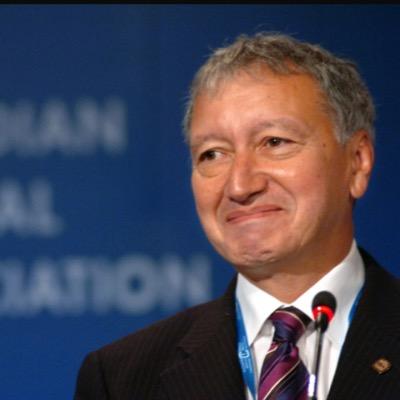
Dr. Brian Day
@DrBrianDay 
- Past President Canadian Medical Association
- Past President Arthroscopy Association of North America
- Honourary Associate Professor University of British Columbia
- 2014 Doctors of BC Don Rix Leadership Award


Dr. Brian Day recently appeared on CBC radio. A transcription of the interview is below.
Listen to the audio version here.
Rick Cluff: Throughout this week, we have been bringing you stories on the current state and the future sustainability of the Canadian medical system. And while we’ve been focusing on the expired health accord with the federal government’s plan to spend about 36 billion dollars less on healthcare the next ten years, another topic of conversation has come up repeatedly in our discussions, and that is the topic of Dr. Brian Day’s constitutional challenge of Canada’s publicly-funded healthcare system. Dr. Day launched his case back in 2009 and after a number of delays, it is finally expected to move into the courtroom in the coming months. Brian Day is an orthopaedic surgeon. He’s also co-owner of the Cambie Surgery Centre here in Vancouver and joins us this morning in Studio 10. Good morning. Welcome.
Brian Day: Good morning, Rick.
RC: When Medicare was established back in the sixties, the idea was everybody, no matter what their income, would have access to high-quality medical care. So why fundamentally change that system by allowing more private care faster for those who can afford it?
BD: Well, that’s not the goal and back in the sixties, Tommy Douglas never intended to create the system we have today, where patients are suffering and in the words of the Supreme Court of Canada, dying on waitlists. And this is not about privatizing the system. No one more than me believes in a strong public health system. I was brought up in England under the National Health Service. But every country on earth, apart from Canada, has some competition for the public system, even if it’s just five or ten percent. And Canada is unique. Unique on the planet in saying to a sick Canadian on a waitlist that look, number one, we are not going to going to deliver timely care in the time that we promised. And two, we’re going to bring in a law to stop you buying insurance to extricate yourself from the pain and suffering.
RC: You say people are dying on waitlists. I mean…
BD: I didn’t say that. The Supreme Court of Canada said that.
RC: Well, the latest report card from Canada’s Wait Time Alliance records that healthcare institutions in this country, on average, receive grades ranging from B to an A+ for wait times. So for most procedures, like joint replacement, radiation therapy, coronary bypass surgery, at least 70 percent of Canadians are getting their treatment, what they need, on a timely basis.
BD: And 30 percent are not, by the definition of what you just said. But let me say, the Wait Time Alliance ranks British Columbia the worst in the country. The only province in which wait times have increased. And secondly, the wait times; when the accord, which you were talking about earlier, was brought into the place, the goal was to look at five areas out of thousands. What about all the other things that aren’t being measured? And one of those, which is not being measured in B.C., in defiance of the federal ruling, the regulation, is wait times for MRIs. Yesterday, I saw a patient who showed me his MRI appointment for April 23rd. And that’s at 8:00pm. Does that sound pretty good to you? (RC: Yes). Well it’s April the 23rd? 2018. 2018. This would not happen in any other rich country on earth.
RC: So in your opinion, does the whole system have to be overhauled?
BD: No, it needs to…
RC: Or just correct wait times?
BD: It just needs a little bit of competition. You know, people who are actually supporters of mine say, you know, we have a socialist health system. I say, no, no, we don’t. We don’t have a socialist health system. If you look at socialist countries, like… even extreme socialist country like communist China, North Korea, Cuba, Laos, Vietnam, none of them have laws say a sick person cannot be covered by insurance. We are the only country on earth that has draconian legislation like this and it makes no sense. You know from the CBC that you perform better because you have some competition. We would not be here… you wouldn’t be here at 4:30am this morning. In the old days where there was no competition. I was brought up with the BBC in England. It didn’t start until 9:00am and kept having interludes (breaks in broadcasting) because it was the only station in town. So competition breeds efficiency. There is no monopoly that I know of that serves consumers well, and that’s what we have in Canada with our health system.
RC: We spoke to Roy Romanow yesterday, as you know, the former chair of the Royal Commission on Healthcare. He joined us and spoke your idea of having some people paying for healthcare and others not. He’s what he had to say.
Roy Romanow: The healthcare system in the United States is essentially a private-funded system, as we all know, and it remains consistently the highest per capita cost charge on their nation’s citizens, of healthcare, of the OECD countries. And the outcomes are amongst the worst.
RC: Evidence shows that a two-tiered system like that in the United States is more costly and less effective. So is that really the direction we should be heading?
BD: The United States does not have a two-tiered system. The Commonwealth Fund, which is a group that focuses on poor individuals, recently ranked (the health systems of) 11 rich countries. Canada was ranked tenth. The United States was ranked eleventh. So why is Romanow comparing ourselves to the only other monopoly system? We have two monopoly systems in the world. Canada’s with a public monopoly and the United States with a private monopoly. I don’t support the U.S. system. And you know, last month, Mr. Lee Kuan Yew, the 91-year-old former prime minister of Singapore died.
RC: Mmm-hmm.
BD: And he… Bloomberg’s ranked Singapore the number one health system in the world. They spend about half as much as we do on their health system. They have no waitlists. The three principles that he espoused in government were telling. And he criticized some Western democracies for - and it applies to our health system - short-termism. Governments get elected on four year cycles. They focus on the next three or four years. He emphasized the importance of not just pandering to the voters. And one group he specifically brought out was children. Children don’t vote, and it’s no coincidence that in the (Canadian federal) health accord, children were left out. The worst waitlists… Some of the worst waitlists in the country are for children, and I have six kids so I’m sensitive to that. And finally, he pointed out that the other problem is in leadership in our Western democracies, is that we elect people to power who are unqualified. So those things apply to our health system. And we need to fix that.
RC: So do you want to scrap the whole thing and start from a new beginning? Or what do you want to do?
BD: No. What I want to do is, for instance, in Canada, 70 percent of Canadians, including Romanow, including all of our opponents who are on salaried work, have a thing called extended health insurance. It’s another name for private health insurance. Those companies like Blue Cross and Great West Life that offer those policies are prepared, for a small, nominal sum, to offer extended private insurance to cover you if the government doesn’t deliver. But we cannot tolerate a system in which the government says, we’re going to give you timely treatment. We’re then going to put you on a waitlist and if we don’t deliver timely treatment, that’s too bad. You have no choice under law. And just to say, this is the most authoritarian health system on the planet.
RC: If you lose the court challenge, then what?
BD: If lose the court challenge? It’s impossible in my mind. Instead of having ideologues like Romanow… and I like Romanow. He’s been to our clinic and I like him. If it were not for ideologues like Romanow, when the facts and evidence are placed before the objective judgement of a court, it will be very, very clear that what Canadians are getting is poor value for money from their health system and we will win that case. And we cannot… It seems to me impossible that a judge will say, B.C. residents on a waitlist should not have the same rights and privileges under the constitution that the Supreme Court of Canada gave to Quebec residents in 2005.
RC: So how do you alleviate those waitlists? Is it only through the private system?
BD: Well, no. The other thing, which is something I’ve been arguing for many years is what we call patient-focused funding. Rather than now, where the Vancouver General Hospital, for instance, is given over a billion dollars and it doesn’t matter whether they treat one patient or 10,000 patients. So everyone coming through the door uses up their (the hospital’s) money. Even in a government system - and this has been shown by the OECD - if the money follows the patient, then efficiencies come and waitlists drop. And the other thing we need is; we need governments to be accountable. If in England, you are not seen, diagnosed, treated and cured or else reach maximum recovery within 18 weeks from seeing your family doctor in a hospital region, in more than 90 percent cases, if they don’t achieve those results, the CEO of the region is fired. We need some accountability.
RC: When do you expect to go to court?
BD: Well, we were supposed to go on March the 2nd, and we got a message from the government after six years… and by the way, I would like to say, this is not me. This is myself and there were six patients, sadly, two of whom were cancer patients who have died during the six year wait…with six days to go to the hearing, the government announced that they have several thousand, they said initially, documents that they have failed to disclose. They were legally bound to disclose them. A week later, we’re told it’s up to 300,000 documents. We believe the government, at least the bureaucrats in the government, are afraid to go to court because they don’t want to face evidence and facts. They don’t want the kind of materials I’ve been listing, talking about to you, they don’t want that out in the public domain. They don’t want four patients, including three… Three of our remaining plaintiffs are children, one of whom who is a child paralyzed after a 27 month wait to get into B.C. Children’s Hospital. They don’t want those people on the stand.
RC: Dr. Brian Day, thank you for coming in this morning.
BD: You’re welcome, Rick.